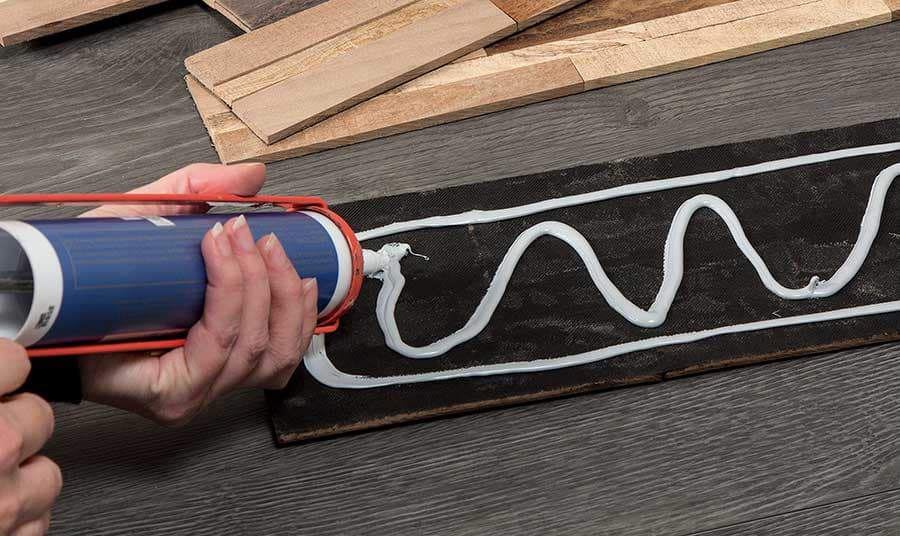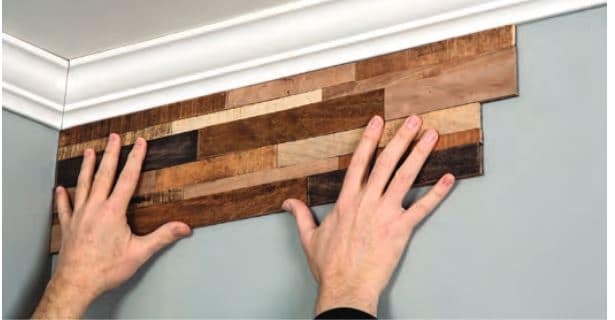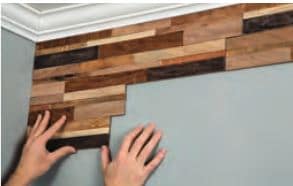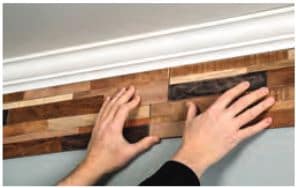Installation Guide
Tools and supplies needed:
Protective eyewear or safety goggles
Measuring tape
Straightedge or Speed Square®
Pencil
File or sandpaper
Miter box (manual or powered) or table saw
Jig saw (if cutting for power or light receptacles)
Level (2’ to 4‘)
Caulk gun and adhesive
Finish nailer or pin nailer (pneumatic)
Before you begin, read this installation guide in its entirety before starting
If you have doubts about doing this installation, you should contact a qualified contractor, carpenter or professional installer. As with all real wood products, Rustic Grove Wood Wall Panels will react to the climate in your home and to seasonal humidity changes. We highly recommend the following preparations to ensure your project satisfaction:
- Remove all panels from the carton and let acclimate to your home’s environment for at least 48-72 hours.
- If your installation will run from floor to ceiling, we recommend leaving a 1/4″ gap (at both the very top and bottom).
- HVAC systems must be operational and controlling site temperatures and humidity.
- The are to receive Rustic Grove Wood Wall Panels must be properly conditioned at normal occupancy temperature (60-70 degrees F), and humidity levels (35-55% humidity), maintained for a minimum of 72 hours prior to installation as well as during and continuously following installation. Do not install in areas subject to moisture.
Note: As with any wood product, there will be some variance in the wood thickness and depth. THis may result in small gaps between rows or panels. We believe these imperfections add character to any rustic wall installation.
However, if you want to conceal gaps, you can cut a sliver from another panel or fill gaps with matching wood putty or even a matching caulk. Be sure to wipe off excess material if the latter products are used.
Proper surface preparation is essential for a successful project
Due to manufacturing variations, we cannot guarantee an exact color match from lot to lot. Prior to installing Rustic Grove Wood Wall Panels, please unpackage and lay out all purchased product to ensure color consistency. If
you encounter unreasonable color variation, please call us at 1-800-434-3750 (7 am-4:30 pm CST, M-F) so that we can assist you with your project.
Failure to follow recommended surface preparation instructions may void the warranty. ACP, LLC is not responsible or liable for any labor costs or damaged product incurred because of improper installation. All product defects are covered under our 5-year warranty.
Affixing panels

We recommend a high-quality polyurethane construction adhesive be applied to the back of each panel in a “S” pattern.
Apply adhesive to the back of the panel. Keep the adhesive a half inch from the edges. Firmly press the panels into place and nail panel in corners. If adhesive squeezes out around the panels, be sure to wipe it off before it dries.
Recommended Adhesives
Brand
- Locite® – PL Premium®
- Locite® – PL Premium Advanced®
- Loctite® – Ultimate (white}
- Manus® – 75 AM HV
- LePage® – PL Premium®
In addition to adhesive, use a finish nailer or pin nailer to hold the panel in place while the adhesive sets. We do not recommend forgoing adhesive and using pin nails only, as the panels could fail over time, especially over drywall.

Layout preparation
Measure the first area to be covered by Rustic Grove Wood Wall Panels. We recommend you lay out the entire project on a flat surface, like a table or floor, before adhering to the substrate to be sure you have enough panels, and your design and layout is correct. This will also give you good reference as to how the panels will look on your wall. As you lay out the panels, make sure the colors (which vary slightly like all wood), and seams are to your liking.
As each project is different, be sure to plan for cutouts, corners. or edge treatments before applying panels. The edge seams will be more visible if they are not aligned. When starting a new row, we recommend a random staggered pattern.
Installation
We recommend placing the first panel at the bottom of the wall in the lower right. You will work your way left for each row.

Beginning from inside corner on right, place the first panel.

Install next row as shown (above). Continue the process for the remaining panels
Be sure the top edge of your first row is level to help insure a consistent even look throughout the entire wall.
For the first row of panels, after applying adhesive, consider using a finish nailer or pin nailer to hold the panel in place to prevent shifting and to create a stable base for subsequent rows.
Note: If the top of your wall is finished with trim, and you’re going to abut panels up to it, you may want to start at the ceiling and work your way down toward the floor. In this case you will want to make sure your panels are level to the top trim, while starting your first panel from an upper left inside corner and working across from left to right. You can abut the first panel to the ceiling or topmost termination point, if not a ceiling.
The first panel and all other panels that abut an inside or outside corner will need to have the overlap notch cut away so there is a straight edge.
Use your miter saw or table saw to cut the notch and create a straight edge. File and/or sand the cut edge smooth.

Starting at the ceiling, start in the upper left corner.

Beginning from inside corner on left, place the first panel.

Continue the process for the next row.


Continue the process for the rest of the wall.
Cutting Panels
A manual or powered miter saw is the recommended cutting tool for the wood panels. Use a jigsaw for cutting notches or other more intricate cutouts such as an electrical outlet.
Measure and layout on a panel where the cut will be made. Cut the panel. Take the cut panel to the workspace and place it in its intended location, ensuring it fits properly. Cut and install all remaining panels using the same steps described above.

A powered miter saw is recommended for straight cuts.

A table saw can also be used for straight cuts.
NOTE: When working around electrical outlets, be sure to turn off power at the fuse box.
To cut panels for electrical receptacles or other cutouts that occur within a single panel, measure and mark the area to be cut out for the outlet box. Do not allow the panel to touch the receptacle itself. Leave about one-eight inch around the receptacle.
Sand or file cut panels if desired and use a wood file or sandpaper to smooth cut edges.

Straight cut edge with notch removed.

Sanding tile edge.
Edge treatment
Many types of edge trims can be found at your local home center. Wood trims look great, too. If a cut edge showing exposed wood doesn’t match, use stain to color it to your satisfaction.
Care after installation
Rustic Grove Wood Wall Panels should be cleaned, if necessary, using a soft cloth or brush attachment on a vacuum cleaner.
Indoor use as a backsplash is acceptable, but as with all natural wood products, there is some inherent risk of staining and rot. For a backsplash installation, sealers or varnish is recommended. Sealers, such as Thompson’s® Water Seal® Waterproofer Plus Clear Wood Protector or Cabot® Waterproofing Silicone Sealer (and similar products), offer moderate protection.
Wood varnish is a durable coating that bonds to the wood surface. These products slightly darken the wood color and have a semi-gloss finish. Wood varnishes, such as Minwax® Polycrylic® Protective Finish or Cabot® Spar Varnish Semi-Gloss )and similar products) provide a high level of stain protection.
Extreme humid or dry environments may affect the wood negatively.


